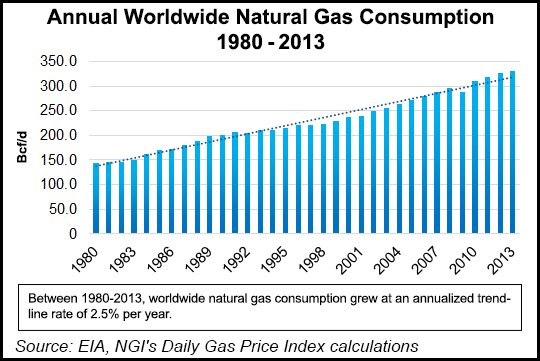Leading Global E&Ps Call for Carbon Pricing to Push Positives of Natural Gas
Implementing a widespread and effective price for carbon emissions is critical to realize the “full and positive impact” natural gas can have, the leaders of six leading global producers, including BP plc and Royal Dutch Shell plc, said Monday.

Several of the CEOs last week said they would call for carbon pricing systems to be put in place by world governments and the United Nations (UN) Framework Convention on Climate Change (UNFCCC). The CEOs who signed onto the joint initiative all run European-based production companies: BG Group plc’s Helge Lund, BP’s Bob Dudley, Eni SpA’s Claudio Descalzi, Shell’s Ben van Beurden, Statoil ASA’s Eldar Saetre and Total SA’s Patrick Pouyanne.
Carbon pricing would create “clear, stable, ambitious policy frameworks that could eventually connect national systems” that would reduce uncertainty and encourage the most effective ways to reduce emissions,” they wrote. The initiative was unveiled one day before the World Gas Conference begins in Paris.
“As we gather in Paris for the World Gas Conference, just months ahead of crucial UN talks on climate change in this same city, we write to highlight the major role natural gas can play in addressing climate change,” the CEOs said. “As a group of business people, we are united in our concern about the challenge — and the threat — posed by climate change. We urge governments to take decisive action at the UN climate change summit in December. We are also united in believing such action should recognize the vital roles of natural gas and carbon pricing in helping to meet the world’s demand for energy more sustainably.”
The joint initiative specifically calls on governments, including UNFCCC negotiations in Paris and beyond to:
Alternative energy “has an increasing role to play, and our companies have significant investments in renewable energy too,” they wrote. “However, the need to cut emissions is so essential that we have to pursue all options to lower carbon while providing the energy the world needs to meet demand from a growing population seeking better living standards. Natural gas can help deliver this.”
The case for natural gas is simple, they said. “When burned to make electricity, it typically generates around half the carbon emissions of coal. In addition, gas can provide the electricity base load that is required and can be a flexible partner to renewable as efforts continue to improve the storage of electricity produced by intermittent solar or wind. This benefit is enhanced when natural gas emissions all along the value chain are controlled and reduced, a matter we are actively addressing with peers.”
Notably absent from the announcement were U.S.-based producers, including ExxonMobil Corp. and Chevron Corp. Last week during the annual meeting, ExxonMobil CEO Rex Tillerson derided renewables and said the company had withdrawn some investments because “we choose not to lose money on purpose” (see Daily GPI, May 28). He also questioned how competent current climate change models are concerning the future impacts of not reducing emissions. However, for years, Tillerson has advocated for carbon taxes over cap-and-trade emission programs (see Daily GPI, Oct. 5, 2009).
ExxonMobil and many other top U.S. producers, like their European counterparts, already use carbon pricing on the expectation that emissions eventually will be regulated (see Daily GPI, Dec. 5, 2013).
The request to policymakers “is not to ask for special treatment for any resource, including natural gas, or any single route to a lower-carbon future,” said the CEOs in their letter. “It is rather to ensure that the outcome of these talks leads to widespread carbon pricing in all countries.”
By implementing a carbon pricing scheme, all forms of low-carbon technology would be stimulated “and drive energy efficiency as rapid urbanization increases demand from our cities. It will benefit all sectors including power, mobility, heating and energy-intensive industries along with renewable energy and natural gas, the cleanest-burning fossil fuel.
“Market forces will operate to favor the least expensive and most efficient ways of reducing carbon in each country or region.”
Pricing carbon, they wrote, “obviously adds a cost to our production and our products,” but “a stable, long-term, global carbon pricing framework would provide our businesses and their many stakeholders with a clear road map for future investments, and a clear role in securing a more sustainable future.”
The leaders said they owed a pledge to future generations to seek realistic and workable solutions to the challenge of providing more energy while tackling climate change. To create and implement a workable approach to carbon pricing, the CEOs said they had contributions to make, including experience, motivation, pragmatism and a forum for discussion.
“As we are already users of carbon pricing systems across the world, exchange of information at international scale could help to identify the best solutions,” they wrote. “We believe our presence at the table could be helpful in designing an approach to carbon pricing that would be both practical and deliverable, as well as ambitious, efficient and effective.”
© 2024 Natural Gas Intelligence. All rights reserved.
ISSN © 1532-1231 | ISSN © 2577-9877 |
